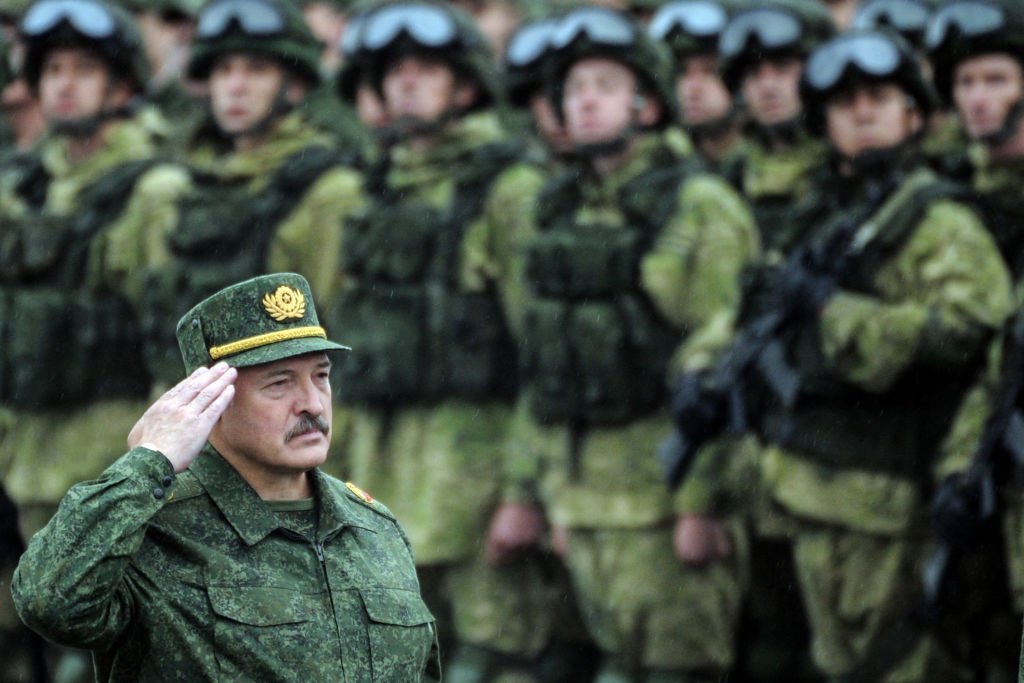Speaking in the city of Grodno near the infamous Suwałki Gap at the Polish-Lithuanian border on Tuesday, Belarusian President Alexander Lukashenko did little to dispel the region’s fearful reputation as a likely flare-up point for a conflict between Nato and Russia. “We are preparing for war,” Lukashenko warned. “Don’t believe anyone that we want to fight. If you want peace, prepare for war.”
These preparations, including the training of military units and supply of weaponry and equipment to the armed forces, echo steps already being taken by many Nato countries. Most notable of these is Belarus’s neighbour Poland, which has invested enormously into defence and war-readiness since Russia launched its invasion of Ukraine. Lukashenko’s rhetoric, meanwhile, is strikingly similar to that of Nato leaders. Just days earlier, Polish Prime Minister Donald Tusk had starkly raised the spectre of a coming war, telling European media that we must now accept we live in “the pre-war era”.
Such warnings, from both sides of the East-West divide, have been construed by some as risible attempts by desperate politicians to whip up fear in order to justify continued spending on the Ukraine war. This is one way to interpret the statement, given in a press conference last week by Czech President Petr Pavel along with security chiefs, that his country faces its most serious security threat since the Second World War. Whether or not such claims are true, they are by now becoming clichéd and prompt little public reaction.
A few weeks earlier, though, the Chief of Staff of the Czech Army sparked a national debate by raising the possibility of reintroducing military service, which was abolished in 2004. In another example of war being treated as inevitable, he said that due to the Russian threat, “some form of military service, whether compulsory or voluntary,” will need to be considered by the Czech government.
The normalisation of such fatalist war rhetoric from all quarters — implying that conflict between Nato and Russia is not just possible but likely — should be taken seriously. It matters little whether Western leaders prophesying conflict are motivated by Churchillian aspirations or pettier political concerns. A nihilistic attitude to the opposition of East and West — and a seeming indifference to exploring ways to take the world off this collision course — is already having destructive diplomatic consequences, even between the oldest of allies.
In March, the Czech government froze meetings with the new Slovakian administration led by “pro-Russian” Prime Minister Robert Fico, after Slovakia’s Foreign Minister met with his Russian counterpart Sergey Lavrov at a conference in Turkey. “We do not consider it appropriate,” explained Czech Prime Minister Petr Fiala, “to hold intergovernmental consultations with the government of the Slovak Republic in the coming weeks or months. It is impossible to hide that there are significant differences of opinion on key foreign policy topics.”
Such a reaction to “significant differences of opinion” among allies — throwing one’s toys out of the pram and refusing to engage — is indicative of a political climate that’s dangerously hostile to negotiation or compromise. Replacing typical diplomatic aims with a resigned acceptance of coming conflict makes impossible the kinds of talks that could prevent such a conflagration from happening. If both West and East continue to turn their backs on diplomacy and debate, Tusk’s words about living in a “pre-war” period may turn out to be a self-fulfilling prophecy.










Join the discussion
Join like minded readers that support our journalism by becoming a paid subscriber
To join the discussion in the comments, become a paid subscriber.
Join like minded readers that support our journalism, read unlimited articles and enjoy other subscriber-only benefits.
Subscribe